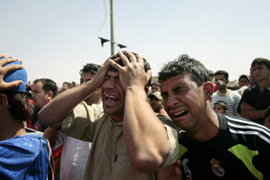Iraqi PM orders halt to raids
“Political solution” considered as al-Sadr plans protests against US forces in Iraq.

According to a government statement, aired on state television, al-Maliki said the pause was designed to give a “chance to those who repented and want to lay down their arms”.
‘Political solution’
Al-Maliki also said that fighters “who lay down their arms and participated in the recent acts of violence” would not be prosecuted.
| Your Views |
But the statement was issued less than 24 hours after al-Maliki told reporters that he intended to launch security operations against Mahdi Army strongholds in Baghdad, including Sadr City, home to about 2.5 million Shias.
Sadiq al-Rikabi, a senior al-Maliki adviser, said: “It is not possible to look for only a military solution. There must be a political solution and that’s why the prime minister issued today’s statement.”
“We must have calm. Many politicians advised al-Maliki against confrontation, warning him that clashes benefited other parties.”
Hassan al-Rubaie, a member of al-Sadr’s 30-member bloc in parliament, told the Associated Press news agency that the decision to stop arrests was made during talks between Sadrist representatives and al-Maliki aides on Thursday.
Al-Rubaie said the freeze applied even in cases where an arrest warrant had been issued and negotiations were under way on other Sadrist demands.
Anti-US protests
The venue for al-Sadr’s protest against US forces had earlier been set for the city of Najaf but a spokesman said it would be more effective in the Iraqi capital and would allow more people to take part.
Salah al-Obeidi, spokesman for Sadr’s office in Najaf, said: “The Sadr movement has decided to change the venue of the huge demonstration that had been announced for Najaf on April 9.”
“A protest in Baghdad will be more effective because it is in the capital, and secondly, a protest there will allow people of other sects to participate.”
Obeidi also said that the protest is “not limited to the Sadr movement. We want all Iraqis to take part. The target of the protest is the [US] occupation”.
The announcement came after crowds of people spilled on to the streets of Shia areas of east Baghdad following Friday prayers to denounce al-Maliki and demand that US troops quit their areas.
“No! No! to occupation. Yes! Yes! to Islam,” chanted the crowd in Sadr City, many of them carrying posters showing a caricature of the prrime minister bearing the words “Maliki is a puppet of Hakim.”
Al-Sadr’s supporters accuse al-Maliki of siding with Abdel Aziz al-Hakim, a rival Shia politician, in the battle for control of Basra.
Continued violence
Meanwhile, at least three people were killed in a US air raid in the southern city on Friday. An AFP news agency photpgrapher said that two of dead were children.
 |
| At least 20 people were kiiled in a suicide blast at a funeral in Diyala [AFP] |
The strike occured in the Al-Haiyaniyah neighbourhood just days after clashes between Shia fighters and Iraqi forces were halted.
The US and British military confirmed the raid.
Major Tom Holloway, a British military spokesman, said that a US Apache helicopter carried out an air raid but had no word on any casualties.
Pictures taken by the AFP photographer showed badly mangled bodies of three people.
Holloway said the helicopter was called in after fighters clashed with Iraqi forces in the neighbourhood at around 16.35pm (1335 GMT).
“We believe the enemy we were engaging were killed,” he said.
When asked about the deaths of the man and two children, Holloway said: “They had militiamen on the rooftops engaging the Iraqi army.”
Funeral attack
In Diyala province, at least 20 people died when an attacker detonated an explosives vest as mourners gathered for the funeral for a Sunni police officer.
More than 20 others were injured in the attack at Hamreen cemetery in the town of al-Sadiyah, about 95km north of the Iraqi capital Baghdad.
Most of the victims of the bombing appeared to be relatives of the dead policeman, an Iraqi police officer said.